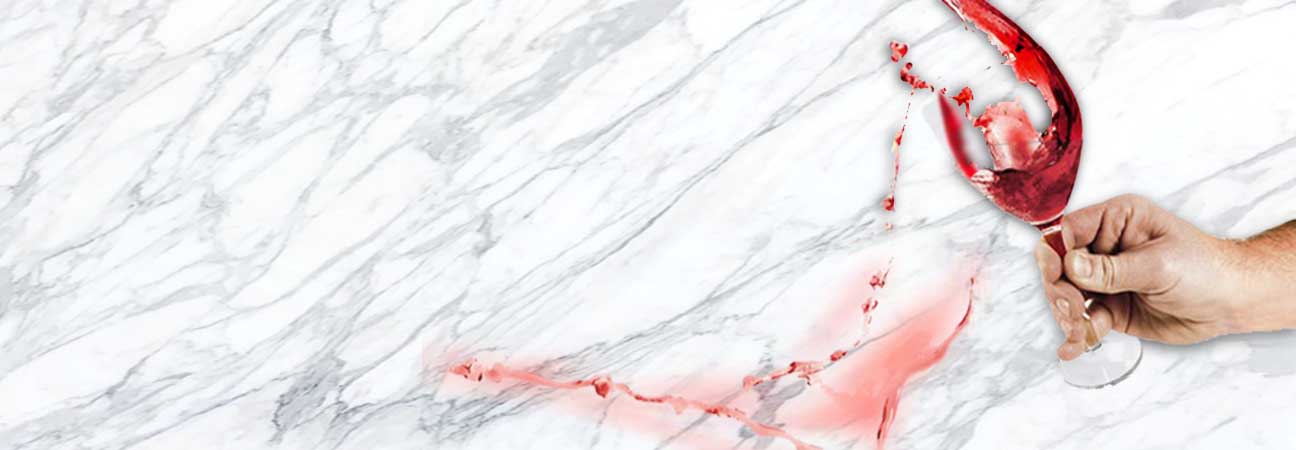
Sealing and Maintenance of natural stone kitchen benchtops and vanity tops
The beauty of natural stone with its intricate movement of veining, some subtle, some dramatic, its depth of patterns and colour hues showcases what nature can produce over millions of years. It is this beauty and craftmanship that draws talented interior designers and stylish home owners to choose natural stone in their home. The composition and characteristics of each stone slab is different. This is what gives it the uniqueness and needs to be taken into consideration when using as an interior design product for classic timeless style or modern, dramatic statements.
The natural stones, such as onyx, quartzite, marble and granite, are formed in nature differently and come with their own unique features. It is these differences which require each natural stone to be handled and cared for. Knowing the porosity and hardness of the natural stone you choose for your home; will ensure you preserve its natural beauty for many years to come through regular cleaning and maintenance.
Sealing your natural stone
It is highly recommended that all natural stone be sealed prior to use.
The sealer will protect your stone from absorbing food, drink and other products that may come in contact with the surface. A sealer will not protect your stone completely from stains and scratches, but will give you time to clean and remove the material from the surface of the stone.
There are many natural stone sealers available, some protect your stone better than others, so research the best sealer for your type of stone. Some sealers need to be resealed more regularly than others, but this is also highly dependent on the stone type and the amount of use your stone gets.
How to clean your natural stone slab
The surface of your stone should be cleaned with warm water and a mild detergent that you use to wash your dishes with. Alternatively, there is soap specifically designed for natural stone available from your hardware store.
Before you use a cleaner on your natural stone, double check the list of ingredients that the cleaner does not contain vinegar, lemon (or any citrus ingredients), or other acids, as these may be harmful to the surface. It is recommended you test any new cleaners in a small, inconspicuous place such as under the benchtop to ensure its compatibility with your stone.
Apply the cleaner gently to the surface with a soft cloth, nothing that is abrasive or rough. Only use a small amount of cleaner, a little goes a long way. If you over use the soap or cleaner, streaks can occur or a build-up of the cleaner, leaving a film.
Avoid all bathroom cleaners as often they are too harsh for the stone and contain acids that are designed to break up soap scum. Never use scouring creams or powders as the abrasives in these products will scratch the stone surface.
For granite and marble, a liquid stone wax can be applied to the surface every 3-6 months depending on your use. Apply the wax with a soft cloth and rub into the surface until the wax disappears, much like applying wax to your car duco. Any wax residue can be removed with ‘oo’ grade dry steel wool.
Clean up spills quickly
The number one rule with natural stone maintenance is to act quickly when food or drink comes in contact with the stone. By cleaning up immediately, the food or drink has less chance of absorbing and staining the stone.
How to prevent stains on your natural stone
- Remove all food and drink debris from the stone, such as tomato and meat particles from spaghetti sauce
- Spot clean the spill only with a clean, dry soft cloth. By spot cleaning you minimise the spill area and do not spread it.
- Once the spill is cleaned, flush the area with clean water and mild soap (dish washing detergent works well). Do this several times to rinse the area thoroughly.
- Dry the area with a clean, soft cloth.
- Repeat these instructions if the spot needs further cleaning.
If you are concerned with the stain or mark left on your stone, your stone fabricator, or a restoration specialist will be able to assess your stone and recommend ways to restore it to its natural beauty.
Etching and Scratching on natural stone
If care is taken with your natural stone, scratching can be minimised. It is the density of the natural stone that determines its likelihood to scratch – the harder the stone, the less likely it will scratch. A quartz slab is extremely dense and hard to scratch or etch during normal household use. On the other hand, an onyx or marble slab are considered softer stones and may be prone to scratches and etching during use.
Etching happens when a highly acidic substance such as citrus juice or vinegar, comes in contact with stone and if not cleaned immediately will leave a light engraving on the stone. The acid in the product has caused a chemical reaction on the stone.
By being aware of the products that can affect your stone is usually enough to keep it looking great. There are also simple ways to prevent scratching and etching from marking your stone slab.
How to prevent scratching and etching of your natural stone
- Follow the method above, and clean up spills immediately.
- For hot saucepans, trays from the oven or dishes out of the microwave, use trivets to protect the surface of the stone from the heat.
- For drinking glasses, particularly wine and citrus juices use coasters to prevent the liquid from coming in contact with the stone.
- Use place mats, glass or wooden boards on anything that may scratch the stone.
